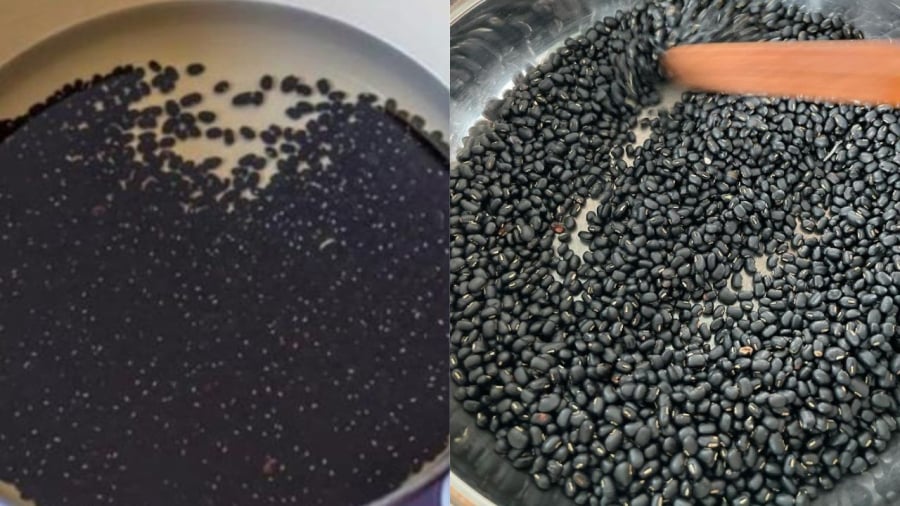Black beans are a highly nutritious food, especially popular during the summer months. Beyond their use in desserts, drinks, and cooling dishes, black beans are renowned for their health benefits. However, to maximize their nutritional value and avoid any unwanted side effects, knowledgeable home cooks often share a secret tip: soaking and roasting black beans before cooking. But why are these two steps so important? Let’s delve deeper into this topic in the article below.
1. Benefits of Soaking Black Beans Before Cooking
Softer beans for faster cooking: One of the most common reasons for soaking black beans is to soften them, thereby reducing cooking time. When soaked in water for 6-8 hours or overnight, the beans absorb moisture, expand, and become tender. This not only saves fuel but also prevents the loss of nutrients due to prolonged cooking.

Removal of anti-nutrients: While black beans are nutritious, they, like many other seeds, contain phytic acid and other anti-nutrients that can hinder the absorption of minerals like iron, zinc, and calcium. Soaking dissolves these compounds into the water, minimizing their negative impact on the body’s ability to absorb nutrients. Thus, soaking is a great way to ensure nutritional safety.
Reduced bloating and improved digestion: Black beans contain oligosaccharides, complex sugars that are difficult to digest and can cause bloating and abdominal discomfort when consumed in large quantities. Soaking black beans before cooking helps remove these sugars, making the beans easier to digest, even for those with a sensitive digestive system.
2. Why Roast Black Beans Before Cooking?
Enhanced flavor and color: Roasting black beans intensifies their distinctive aroma and flavor. When used for brewing drinks or making desserts, pre-roasted beans yield a darker brown liquid with an enticing fragrance, making it much more palatable than using raw beans. This is one of the key techniques employed in preparing black bean drinks to detoxify and cool the body.
Retained nutrients: Lightly roasting the beans before cooking helps seal in the nutrients during the cooking process. Additionally, dry roasting deactivates unfavorable enzymes and reduces the presence of naturally occurring harmful antioxidants in the beans.
Roasting also mitigates the cooling properties of black beans, making them more suitable for individuals prone to stomach coldness.
Extended shelf life: Roasting beans before cooking or storing helps reduce moisture and eliminate bacteria, mold, and other microorganisms that may be present in raw beans. If you plan to store beans for an extended period, a light roast is an excellent way to ensure the beans remain dry, mold-free, and insect-free.
3. Guide to Soaking and Roasting Black Beans Properly
a. How to Soak Black Beans
Rinse the black beans and discard any damaged, shriveled, or insect-infested beans.
Soak the beans in clean water for 6-8 hours or overnight. You can add a pinch of salt to aid in the cleaning process. In hot weather, change the water periodically to prevent fermentation.
After soaking, rinse the beans again and drain them before cooking or roasting.

b. How to Roast Black Beans
Place the drained beans in a dry pan and turn on the heat to low.
Roast the beans evenly for about 10-15 minutes, until they emit a pleasant aroma and their skins begin to crack slightly.
Avoid over-roasting, as it may compromise the nutritional value or produce harmful substances.
Once roasted, allow the beans to cool before using them for cooking or storing them in an airtight container in a dry place.
4. Precautions When Using Black Beans
Individuals with a cold constitution, cold hands and feet, or low blood pressure should consume black beans in moderation and not excessively.
Avoid combining black beans with milk or spinach, as these foods are believed to have incompatible effects when consumed together.
If drinking black bean water daily, it is recommended to consume it warm and not to keep it overnight. It is also best to limit consumption to 300-500ml per day.
Soaking and roasting black beans before cooking is not just a kitchen trick but also a way to safeguard your health and maximize the nutritional benefits of this versatile legume. By soaking the beans, they become softer, more digestible, and easier for the body to absorb nutrients from. Roasting, on the other hand, enhances the flavor, color, and shelf life of the beans. Whether you’re preparing desserts, drinks, or savory dishes, don’t skip these two crucial steps. A little extra effort goes a long way in bringing numerous benefits to your family’s health and well-being!
































